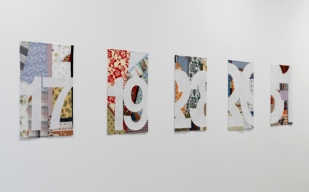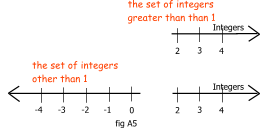|
numbersSimplified
|
|
by the numbers> Home> Articles > Podcasts >> Prime Numbers > Glossary > Artists > About > Contact > Write for Us alpha project team members
T Jean Egan |
thoughts on numbers, what they tell us, and what they don't.
Prime Numbers
Q1: 1 is a prime number. TRUE or FALSE? Q2: what part of the formal definition of a prime number precludes 1? Q4: since all even numbers are divisible by 2, are there any even prime numbers?
Ian Steward:Who would have imagined that something as straightforward as the natural numbers (1, 2, 3, 4, . . .) could give birth to anything so baffling as the prime numbers (2, 3 ,5, 7, 11, . . .)? thoughts from the author:Prime numbers. Beautiful, mysterious, deceptively simple, and yet tantalizing in the depth of their complexity. If we listen closely when mathematicians talk of primes, listen beyond their rigorous definitions, their theorems, the equations of their proofs, we hear a captivating story infused with awe and wonder. Prime numbers are the numbers on which, it is said, all other natural numbers are built. The prerequisite for inclusion is straight forward: a natural number other than 1, evenly divisible only by 1 and itself. 2, 3, 5, 7, 9, 11, 13, 17, 19, and so on. Simple, yes? Then again, perhaps not. The problem, to state it simply: once we have found one, say the largest one we know of, we don't quite know where we will find the next one. We know it's out there but is it the next counting number, or the one after that, or after that? We can't quite say with any certainty where it might be. And therein lies the cruxt of the problem. We are unable to pinpoint the distribution of primes within the natural numbers. It is exactly this juxtaposition of simplicity and complexity that forever fascinates. So here we begin our twitter quiz (#numberquiz). And what better place to begin, than at the beginning, with the basic definitions.
Enjoy . . . answers:A1: FALSE. Although the primality of 1 has come and gone over the years, we now accept, by definition, that 1 is not a prime number. Neither is it a composite number. It is a special case in the natural numbers defined as unit. A2: The exact phrase will depend on the source of the definition you use i.e. the math text or math book from which you are quoting. Most commonly, the phrase will be either "integers greater than 1" or "natural numbers other than 1". Both exclude 1 from the set of numbers under consideration.
A3: TRUE. The resulting sets are the same as in fig A3.
A4: Yes, 2 itself.
A5: FALSE. For the case of "integers greater than 1", one, zero, and all negatives are removed leaving only the counting numbers 2, 3, 4, and so on, left in the set. For the case of "integers other than 1, only 1 is removed leaving all the negative integers, zero, and all the counting numbers 2, 3, 4, and so on as shown in fig A5.
Leonard Euler:Mathematicians have tried in vain to this day to discover some order in the sequence of prime numbers, and we have reason to believe that it is a mystery into which the mind will never penetrate. and more . . .
John Voight Seeks Prime Secrets
The Prime Pages
The Electronic Frontier Foundation's Cooperative Computing Award
|
| ©numbersSimplified.com 2012 | |


